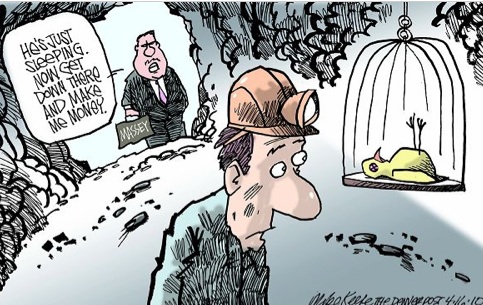Carbon rule for power plants has the coal interests fighting hard.
The publication of the EPA’s carbon rule for power plants has prompted a flurry of legal and legislative action, ushering in a lengthy battle over the future of the Obama administration’s key climate change initiative.
More than two dozen states and a slew of interest groups and companies sued over the Clean Power Plan.
Leading state attorneys general called the rule an illegal expansion of federal power that they said will have a dramatic impact on electricity pricing, grid reliability and jobs.
On Capitol Hill, Republicans geared up for their own attempt at repealing the rule, perhaps forcing a veto from President Obama.
The Clean Power Plan is intended to cut carbon emissions from the power sector by 32 percent over the next 15 years by assigning carbon targets to states and asking them to find ways to hit them.
In a statement, McConnell repeated his long-held argument against the regulations: that they will hurt his state’s coal industry by forcing a transition to cleaner energy.
“Here’s what is lost in this administration’s crusade for ideological purity: the livelihoods of our coal miners and their families,” he said in a statement.
“I have vowed to do all I can to fight back against this administration on behalf of the thousands of Kentucky coal miners and their families, and this CRA is another tool in that battle. The CRAs that we will file will allow Congress the ability to fight these anti-coal regulations.”
On the legal front, more than half the states affected by the Clean Power Plan have filed lawsuits against it.
West Virginia Attorney General Patrick Morrisey, a Republican, said he hopes a federal court will block implementation of the rule while considering the broader legal case against it.
Morrisey said the EPA doesn’t have the power under to regulate carbon emissions from power plants in the way it has proposed. He equated the rule to a cap-and-trade system, something Congress considered but rejected during the early years of Obama’s presidency, and contended the EPA “cannot use the regulatory apparatus of the executive branch to push policies the Congress does not approve.”
EPA officials and the Obama administration were quick to defend the rule on Friday. In a blog post detailing the Clean Power Plan’s legality and scientific basis, EPA Administrator Gina McCarthy said the regulations are on strong legal ground.
“The plan is fully consistent with the Clean Air Act, and relies on the same time-tested state-federal partnership that, since 1970, has reduced harmful air pollution by 70 percent, while the U.S. economy has tripled,” she wrote.
White House spokesman Eric Schultz said he wasn’t surprised to see Republican critics “rush to the courts to try and prevent something they weren’t able to do legislatively,” and dismissed their chances of success.
Obama is certain to get support from some outside sources. A group of 15 Democratic attorneys general led by New York’s Eric Schneiderman said Friday they would file motions supporting the rule come next week.
Green groups are primed to do the same. “The Clean Power Plan will have a powerful army of defenders as well, in this court battle,” said David Doniger, director and senior attorney for the climate and clean air program at the Natural Resources Defense Council.

